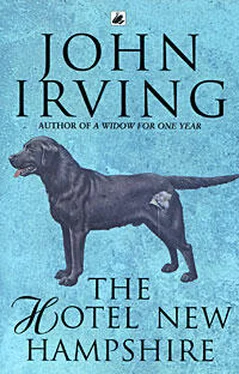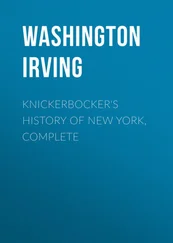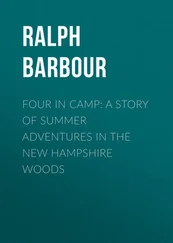And Junior Jones would marry Franny—finally! “This is a fairy tale,” Franny told me, long distance, “but Junior and I have decided that if we save it any longer, we won’t have anything worth saving.” Franny was sneaking up on forty at the time. The Black Arm of the Law and Hollywood had, at least, Schlagobers and blood in common. I suppose that Franny and Junior Jones would strike people—in their New York and their Los Angeles life—as “glamorous,” but I often think that so-called glamorous people are just very busy people. Junior and Franny were consumed by their work, and they succumbed to the comfort of having each other’s arms to fall exhausted into.
I was truly happy for them, and only sorry that they both announced that they would have no time for kids. “I don’t want children if I can’t take care of them,” Franny said.
“Ditto, man,” said Junior Jones.
And one night Susie the bear told me that she didn’t want children either, because the children she gave birth to would be ugly, and she wouldn’t bring an ugly child into the world—not for anything, she said; it was simply the cruelest life one could expose a child to: the discrimination suffered by people who aren’t good-looking.
“But you’re not ugly, Susie,” I told her. “You just take a little getting used to,” I told her. “I think you’re really attractive, if you want to know.” And I did think so; I thought Susie the bear was a hero.
“You’re sick, then,” Susie said. “I got a face like a hatchet, like a chisel with a bad complexion. And I got a body like a paper bag,” she said. “Like a paper bag of cold oatmeal,” Susie said.
“I think you’re very nice,” I told her, and I did; Franny had shown me how lovable Susie the bear was. And I had heard the song Susie the bear taught Franny to sing; I’d had some interesting dreams concerning Susie’s teaching me a song like that. So I repeated to her, “I think you’re very nice.”
“Then you’ve got a brain like a paper bag of cold oatmeal,” Susie told me. “If you think I’m very nice, you’re a real sick boy.”
And one night when there were no guests in the Hotel New Hampshire, I heard a peculiar creeping sound; Father was as likely to walk around at night as he was likely to walk around in the daylight—because, of course, it was always nighttime for him. But wherever Father went, the Louisville Slugger trailed after him or searched ahead of him, and as he grew older his gait more and more resembled the gait of Freud, as if Father had psychologically developed a limp—as a form of kinship to the old interpreter of dreams. Also, wherever Father went, Seeing Eye Dog Number Four went with him! We were negligent about keeping Four’s toenails clipped, so that Father, accompanied by Four, made quite a clatter.
Old Fred, the handyman, had a room on the third floor and slept like a stone at the bottom of the sea; he slept as soundly as the abandoned weirs, ruined by seals and now sunk in the mud flats, now rinsed by the tide. Old Fred was a sundown and sunup sort of sleeper; because he was deaf, he said, he didn’t like to be up at night. Especially in summer, the Maine nights are vibrant with noise—at least when you compare the nights to the Maine days .
“The opposite of New York,” Frank liked to say. “The only time it’s quiet on Central Park South is about three in the morning. But in Maine,” Frank liked to say, “about three in the morning is about the only time anything’s going on. Fucking nature comes to life.”
It was about three in the morning, I noted—a summer night, with the insect world teeming; the seabirds sounded fairly restful but the sea was no less determined. And I heard this peculiar creeping sound. It was at first hard to tell if it was outside my window, which was open—though there was a screen—or if the sound was outside my door, in the hall. My door was open, too; and the outside doors to the Hotel New Hampshire were never locked—there were too many of them.
A raccoon, I thought.
But then something much heavier than any raccoon shuffled across the bare floor at the landing to the stairs and softly padded down the carpeted hall toward my door; I could feel the weight of whatever it was—it was making the floorboards sigh. Even the sea seemed to quiet itself, even the sea seemed to listen to whatever it was—it was the kind of sound you hear in the night that makes the tide pause, that makes the birds (who never fly at night) float up to the sky and hang suspended as if they were painted there.
“Four?” I whispered, thinking that the dog might be on the prowl, but whatever was in the hall was too tentative to be Seeing Eye Dog Number Four. Four had been in the hall before; old Four wouldn’t be pausing at every door.
I wished I had Father’s baseball bat, but when the bear lurched into my doorway I realized there was no weapon in the Hotel New Hampshire powerful enough to protect me from this intruder. I lay very still, pretending to be sound asleep—with my eyes wide open. In the flat, blurred, flannel-soft light of the predawn, the bear seemed huge. It stared into my room, at my motionless bed, like an old nurse taking a bed check in a hospital; I tried not to breathe, but the bear knew I was there. It sniffed, deeply; and very gracefully, on all fours, it came into my room. Well, why not? I was thinking. A bear began my life’s fairy tale; it is fitting that a bear should end it. The bear shoved its warm face near mine and breathed in everything about me; with one purposeful sniff, it seemed to review my life’s story—and in a gesture resembling commiseration, it placed its heavy paw on my hip. It was quite a warm summer night—for Maine—and I was naked, covered by just a sheet. The bear’s breath was hot, and a little fruity—perhaps it had just been feeding in the wild blueberries—but it was surprisingly pleasant breath, if not exactly fresh. When the bear drew back the sheet and looked me over, I felt just the tip of the iceberg of fear that Chipper Dove must have felt when he truly believed that a bear in heat wanted him. But this bear rather disrespectfully snorted at what it saw. “Earl!” said the bear, and rather roughly shoved me; it made room beside me for itself and crawled into my bed with me. It was only when it embraced me, and I identified the most distinctive component of its strange and powerful scent, that I suspected this was no ordinary bear. Mixed with the pleasure of its fruited breath, and the mustard-green sharpness of its summer sweat, I detected the obvious odor of mothballs .
“Susie?” I said.
“Thought you’d never guess,” she said.
“Susie!” I cried, and turned to her, returning her embrace; I had never been so happy to see her.
“Keep it down,” Susie ordered me. “Don’t wake up your father. I’ve been crawling all over this fucking hotel trying to find you. I found your father first, and someone who says ‘What?’ in his sleep, and I met an absolute moron of a dog who didn’t even know I was a bear—the fucker wagged his tail and went right back to sleep. What a watchdog! And fucking Frank gave me the directions—I don’t think Frank should be trusted to give the directions to Maine , much less to this queer little part of the wretched state. Holy cow,” said Susie, “I just wanted to see you before it got light, I wanted to get to you while it was still dark, for Christ’s sake, and I must have left New York about noon, yesterday, and now it’s almost fucking dawn,” she said. “And I’m exhausted,” she added; she started to cry. “I’m sweating like a pig in this dumb fucking suit, but I smell so bad and look so awful I don’t dare take it off.”
Читать дальше












